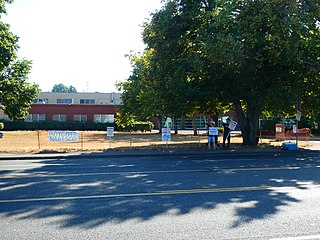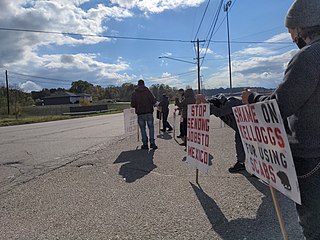
The Coors Brewing Company is an American brewery and beer company based in Golden, Colorado that was founded in 1873. In 2005, Adolph Coors Company, the holding company that owned Coors Brewing, merged with Molson, Inc. to become Molson Coors. The first Coors brewery location in Golden, Colorado is the largest single brewing facility operating in the world.

The Pullman Strike was two interrelated strikes in 1894 that shaped national labor policy in the United States during a period of deep economic depression. First came a strike by the American Railway Union (ARU) against the Pullman factory in Chicago in spring 1894. When it failed, the ARU launched a national boycott against all trains that carried Pullman passenger cars. The nationwide railroad boycott that lasted from May 11 to July 20, 1894, was a turning point for US labor law. It pitted the American Railway Union (ARU) against the Pullman Company, the main railroads, the main labor unions, and the federal government of the United States under President Grover Cleveland. The strike and boycott shut down much of the nation's freight and passenger traffic west of Detroit, Michigan. The conflict began in Chicago, on May 11 when nearly 4,000 factory employees of the Pullman Company began a wildcat strike in response to recent reductions in wages. Most of the factory workers who built Pullman cars lived in the "company town" of Pullman just outside of Chicago. Jennie Curtis who lived in Pullman was president of seamstress union ARU LOCAL 269 gave a speech at the ARU convention urging people to strike. It was designed as a model community by its namesake founder and owner George Pullman.
Solidarity action is industrial action by a trade union in support of a strike initiated by workers in a separate corporation, but often the same enterprise, group of companies, or connected firm.

The Wapping dispute was a lengthy failed strike by print workers in London in 1986.

ATI Inc. is an American producer of specialty materials headquartered in Dallas, Texas. ATI produces metals including titanium and titanium alloys, nickel-based alloys and superalloys, stainless and specialty steels, zirconium, hafnium, and niobium, tungsten materials, forgings and castings.

Staedtler Mars GmbH & Co. KG is a German multinational stationery manufacturing company based in Nuremberg. The firm was founded by J.S. Staedtler (1800–1872) in 1835 and produces a large variety of stationery products, such as writing implements, art materials, and office supplies.
The Remington Rand strike of 1936–1937 was a strike by a federal union affiliated with the American Federation of Labor (AFL) against the Remington Rand company. The strike began in May 1936 and ended in April 1937, although the strike settlement would not be fully implemented until mid-1940.
The Kohler strikes at the Kohler Company, just west of Sheboygan, Wisconsin in 1934 and 1954, are landmarks in the history of both business and labor in the United States. Labor leaders have often cited the warfare at the giant plumbing supply company in their contention that workers need unions. Industrial leaders have pointed to the strikes as examples of union belligerence and indifference toward the true welfare of their employees.
The Esterbrook Pen Company is a former American manufacturing company founded by English immigrant Richard Esterbrook and based in Camden, New Jersey. It was the largest pen manufacturer in the United States, having reached a record of producing 216,000,000 pens a year. The company produced dip pens, then concentrating on fountain pens until it was acquired by Venus Pencils in 1967, ceasing activities in 1971.

The Detroit Newspaper Strike was a major labor dispute which began in Detroit, Michigan on July 13, 1995, and involved several actions including a local boycott, corporate campaign, and legal charges of unfair labor practices. The primary action involved around 2,500 members of six labor unions going on strike from July 13, 1995, to February 14, 1997. The unions ended their strike on February 14, 1997, and it was resolved in court three years later, with the journalists' union losing its unfair labor practices case on appeal.

James Vinson Carmichael was member of the Georgia General Assembly, an attorney, business executive, and candidate for Governor of Georgia.
The Farah strike (1972–1974) was a labor strike by the employees of Farah Manufacturing Company, a clothing company in El Paso, Texas and New Mexico. The strike started at the Farah plant in San Antonio in 1972 when the Hispanic women, called Chicanas, led by Sylvia M. Trevino, at the company demanded a labour union formation to fight for better working conditions. The two-year long strike included 4,000 individuals, of which the majority were women.

The Coors strike and boycott was a series of boycotts and strike action against the Coors Brewing Company, based in Golden, Colorado, United States. Initially local, the boycott started in the late 1960s and continued through the 1970s, coinciding with a labor strike at the company's brewery in 1977. The strike ended the following year in failure for the union, which Coors forced to dissolve. The boycott, however, lasted until the mid-1980s, when it was more or less ended.

The 2021 Nabisco strike was a labor strike involving workers for the American snack manufacturer Nabisco, a subsidiary of Mondelez International. The strike began at a Nabisco facility in Portland, Oregon on August 10 and over the next few days spread to several more Nabisco facilities throughout the United States.
The 1914–1915 Fulton Bag and Cotton Mills strike was a labor strike involving several hundred textile workers from the Fulton Bag and Cotton Mills in Atlanta, Georgia, United States. The strike, which involved about 500 millworkers, began on May 20, 1914, and ended almost a year later on May 15, 1915, in failure for the strikers.

The 2021 Kellogg's strike was a labor strike started on October 5, 2021 and ended December 21, 2021 involving about 1,400 workers for food manufacturer Kellogg's, unionized as members of the Bakery, Confectionery, Tobacco Workers and Grain Millers' International Union (BCTGM). The strike was caused due to disagreements between the union and company concerning the terms of a new labor contract, with particular points of contention concerning the current two-tier wage system, health care, holidays, retirement benefits, cost-of-living adjustments, and vacation time. The strike affected all of Kellogg's cereal-producing plants in the United States, consisting of plants in Battle Creek, Michigan; Omaha, Nebraska; Lancaster, Pennsylvania; and Memphis, Tennessee. It is one of several strikes conducted by the BCTGM in 2021, including strike action against Frito-Lay and Nabisco.
The 1985–1987 Watsonville Cannery strike was a labor strike that involved over 1,000 workers at two food processing facilities in Watsonville, California, United States. The facilities were owned by Watsonville Canning and Richard A. Shaw Inc., two of the largest frozen food processors in the United States, while the workers were all union members of the International Brotherhood of Teamsters (IBT) Local 912. The strike began on September 9, 1985, and completely ended about 18 months later, on March 11, 1987.
Workers for the Scripto company in Atlanta, Georgia, United States, held a labor strike from November 27, 1964, to January 9, 1965. It ended when the company and union agreed to a three-year contract that included wage increases and improved employee benefits. The strike was an important event in the history of the civil rights movement, as both civil rights leaders and organized labor activists worked together to support the strike.
The 1945–1946 Charleston Cigar Factory strike was a labor strike involving workers at the Cigar Factory in Charleston, South Carolina, United States. The strike commenced on October 22, 1945, and ended on April 1 of the following year, with the strikers winning some concessions from the company.
The 1937 Fleischer Studios strike was a labor strike involving workers at Fleischer Studios in New York City. The strike commenced on May 7 of that year and ended on October 12. The strike was the first major labor dispute in the animation industry and resulted in the industry's first union contracts.












